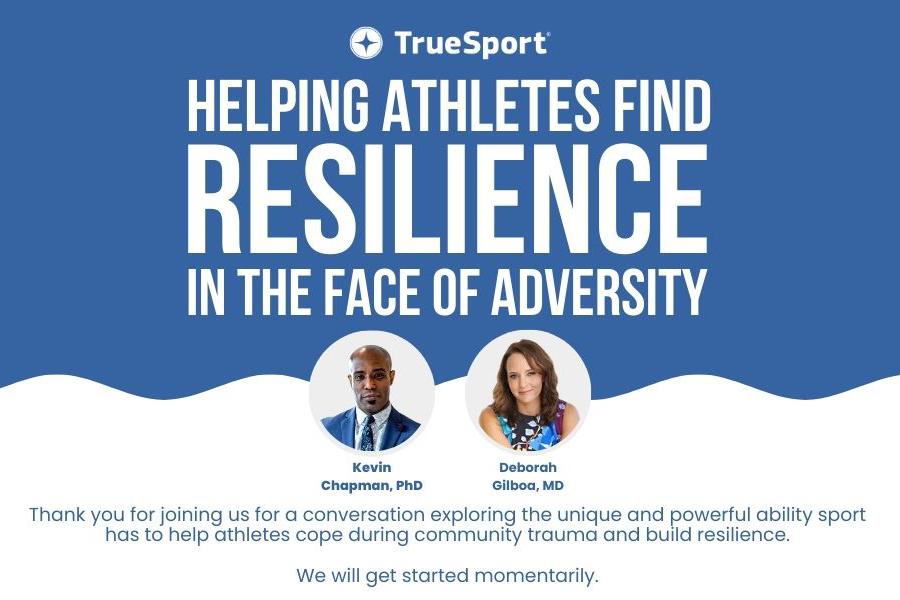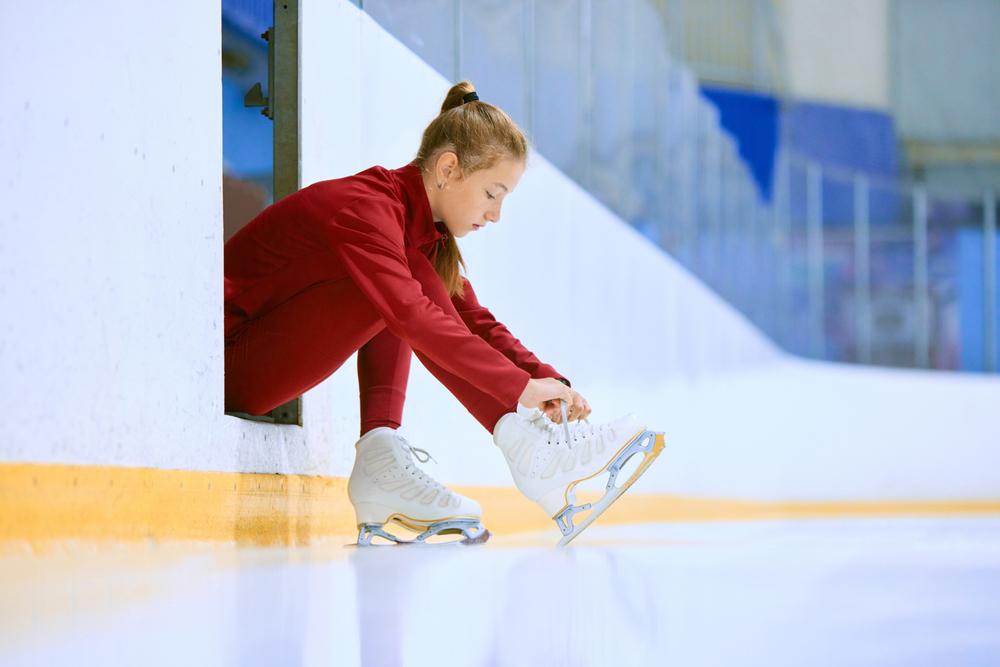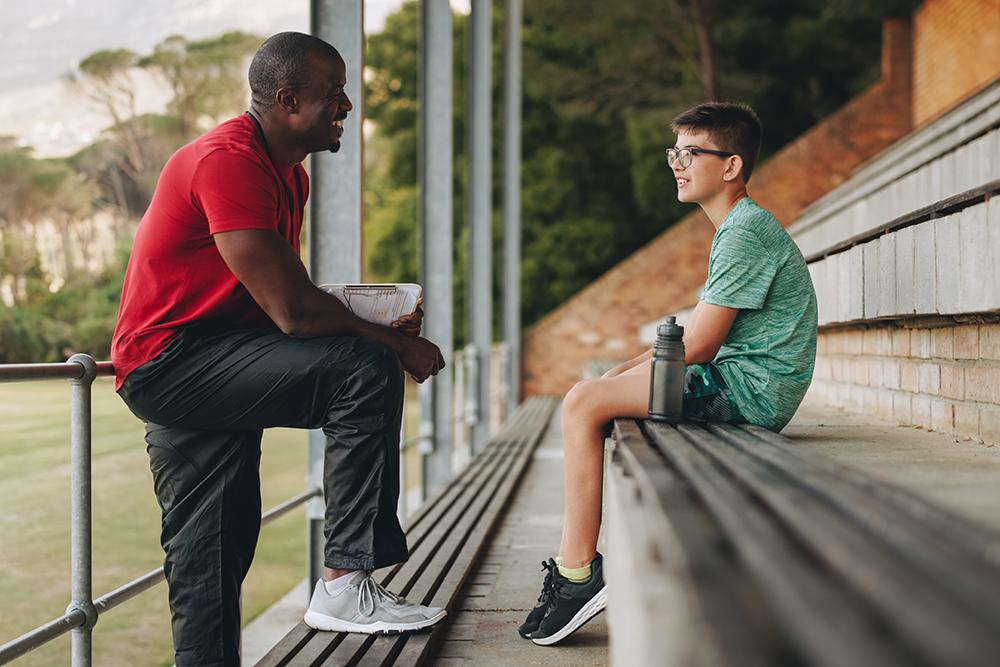Kara Winger: Hi, I am Kara Winger. I’m a javelin thrower and your host for the TrueSport Expert Series 2022. Today we’re talking about how to celebrate effort and failure in sport with Amanda Stanec.
Dr. Amanda Stanec: Hi Kara, how you doing?
Kara Winger: I’m great. How are you?
Dr. Amanda Stanec: Good. Thanks for having me.
Kara Winger: You’re very welcome. Welcome to snowy Colorado Springs.
Dr. Amanda Stanec: I love Colorado Springs and I love snow, so we’re really happy here today.
Kara Winger: Well, we’re here to talk about effort and failure in sports. There are a lot of stories about the glory and the success and all of that stuff, but it’s also important to be able to celebrate effort and failure and for effort and failure to be OK in sports.
Dr. Amanda Stanec: Absolutely. I think for any child coming to sport, the number one thing that should be the priority of everybody is that they have a joyful experience. You can make mistakes and have joyful experiences, if the people guiding you and leading you understand that the process is far more important and your effort is far more important than the outcome. If you don’t try a new skill in a game like where are you ever going to perfect it? And world class athletes make mistakes in games, so we should assume and expect that kids will, and we shouldn’t punish them for that. We should actually tell them how proud we are of them for going for it. So, I think it’s just critically important that we really focus in at the youth level of reminding the kids do their best always. We do want them to try. It doesn’t mean you show up and you don’t try and that’s OK, but you do your best. You give your best effort and you’re going to make mistakes, expect them, hold your head up high, continue to push through.
Kara Winger: Because you don’t know where your boundaries are until you push them, right?
Dr. Amanda Stanec: Absolutely.
Kara Winger: So, my journey has involved a lot of injury, and one of my favorite things that I’ve learned from PT is that you don’t know you’re 100% until you’re 100%. And that is so much like in a game like, you can’t necessarily recreate the emotions that you’re going to have until the pressure’s on and you’re trying to perform in a way that you haven’t since you had this injury. And it’s just it’s so the same when you’re learning how to be an athlete as a kid.
Dr. Amanda Stanec: Yeah, that’s a great quote. And you know, what’s so unfortunate is when you’ll be at these youth sport events and a child will go and take a risk, you know, try something new for the first time or do a more advanced skill. And then you hear audible sighs from some of the parents in the stands or the coach on the sideline because the child wasn’t successful instead of like, way to try that, you know, and so if we want it to be joyful, we know the number one reason kids play sport is for fun. And the number one reason that they leave is because it isn’t fun. People hear that sometimes, and they think, oh, fun doesn’t mean you’re trying or fun doesn’t mean it’s competitive, but I think we just need to help reeducate people. That fun is actually competing. Fun is doing your best. Fun is trying new things.
Kara Winger: Yes. And I definitely growing up had those really fun experiences with teammates. I think it’s very natural as a kid for your friends to be the ones that are making this really fun experience, everything that you want it to be. So, that comes naturally to the kids. How can coaches and parents really foster that atmosphere of fun?
Dr. Amanda Stanec: I think they just really need to focus in on how we define success. Like, success, sure, we all like to win, right? But you can also lose or not win and feel good about yourself and feel good about your effort and feel good about your performance. So, again, just this education for all the youth coaches and the parents of this is what success looks like, and this is how we’re going to celebrate success when we see it. And just being really intentional about that.
Dr. Kara Winger: You’re speaking directly to my heart. I have had a lot of disappointments. Like I said, there’s a lot of injury in my career. I had experiences on team sports as a kid growing up that were really difficult. But like, I got out of it what I needed to get out of it. I knew that I did my best and so I could move forward and be proud of the effort that I put in. But how can coaches reward that effort, like reward the effort of a child in a game who’s doing their best?
Dr. Amanda Stanec: What coaches can do is really verbalize with the team and establish a culture where taking risks and trying new things and doing your best is celebrated. They need to encourage teammates to also acknowledge when their teammate tries a new skill or does better than they’ve ever done before and say, you know, be a great teammate, don’t just, oh, notice it and not say anything, like go and build up your teammate and say that. Coach can in front of the team, praise the effort, even if it was a mistake, even if they swung and missed. But it was a new skill that they were trying.
Kara Winger: I saw what you were trying to do, and I appreciate the effort.
Dr. Amanda Stanec: And say it in front of the team so that the team knows I don’t have to play in fear here. Coach is going to be proud of us for doing our best. They can hold their head high and think I’m going to go for it again tomorrow. And I think that just would make it all so much more joyful. And then we’re keeping more kids wanting to play the game. Like you mentioned, you quit team sport.
Kara Winger: Yes, I did.
Dr. Amanda Stanec: Lucky for the U.S. we get you throwing the javelin, but.
Kara Winger: It was meant to be 100%. I love what you said about culture, though, and culture for me is so much about consistency. So, really like continuing to give those messages to the whole team that making mistakes is OK. That’s how you learn and extending that messaging, like you said to the parents, to the guardians of the kids, to reassure them that that is OK, like that is what we’re looking for and how we’re going to grow together as a team.
Dr. Amanda Stanec: Yes, kids need that specific feedback. And in order to establish this inclusive culture where everyone feels a part and everyone contributes, that praise has to be public because then it’s really to everyone, right? And it might not just be, hey Kara, it could be to you and for others with different examples of when people made a mistake but went for something, seeing the play, trying to make the pass. Maybe it didn’t get there, but it was the right idea. It was creative and it was thoughtful. And so, just letting these kids know we see their effort. I mean, what is the purpose of sport? Right?
Kara Winger: And there were a lot of times growing up on those team sports that I felt all the pressure to perform no matter what. And there was some yelling in the team atmosphere. It was just not great. So, I definitely ran away from that when I found individual sport and I had control over it, and I could navigate learning how to do my sport as well as I could on my own and make mistakes on my own. Like I grew up luckily in this amazing family that that was OK to feel, I had only gotten that messaging from teams. Like that it wasn’t OK. So to be able to be autonomous and be encouraged by my parents and by my very close friends and family in this individual pursuit was so much more where I found my strength. And yeah, that’s just because I was allowed to fail in those situations and learn from it.
Dr. Amanda Stanec: Yeah. You know, I always like to say that good teams, highly skilled teams don’t win championships. It’s teams with the great culture. Where it’s joyful for all the kids. Every kid feels a part of it. And we can give anecdotal story after story to illustrate that. And so I just would love every kid in the country to get to experience that. You know, I think it worked out great, like, as I said, for the U.S. that you went into individual, but it could have been also wonderful for you to gain more skills and experiences in team sports longer as well. You could have kept throwing the javelin.
Kara Winger: Yeah. And I, you know, I stuck with it. I’m pretty stubborn. Yeah, the perseverance. So, I was on the basketball team, all of high school, you know, despite the risk of injury after I knew I was maybe going to go to college for javelin. And so I always really wanted that team experience that was very supportive and collaborative. And built on itself and all that stuff. But it was rewarding in other ways. I know that I did my best, which is the whole point of what we’re talking about.
Dr. Amanda Stanec: Yeah. How did it differ for you, Kara? You know, going from youth sport to elite sport in terms of accepting that there is this risk of, you can call it mistake, you can call it failure. But like, how did that feel for you and how did it differ from a youth to then this four- time Olympian?
Kara Winger: You know, I think I learned through that kind of yearning for connection with teammates, that that is really for me what is important in sport. I had a lot of potential early in my career, and I’m not going to say I didn’t live up to it like I’ve been really successful. But in terms of what my Olympic dreams were, I didn’t get there. Four Olympics is very cool, but no finals, just objectively not what an Olympic athlete is looking for out of those experiences in terms of performance. Socially, teammate wise, I can’t believe how rewarding it’s been to be on all these teams. So, to get that out of a team as an individual sport athlete has been absolutely incredible. And I wouldn’t trade it for the world.
Dr. Amanda Stanec: And you totally have earned it and you deserve it. So, it’s really fun to cheer you on.
Kara Winger: Thank you.
Dr. Amanda Stanec: Yeah.
Kara Winger: Well, I grew up with an incredible mom who made me all these meals to eat in the car between practices and games and tournaments, and I remember I rolled my ankle really bad at a basketball tournament the week before my first state championship and I was losing my mind in the car like sobbing, and my life is over, I don’t get to go to state. This is terrible. And I will never forget how she talked me down. We made a plan. We executed that plan that week, and then I went and won my first state championship.
Dr. Amanda Stanec: Oh my gosh, that’s amazing.
Kara Winger: With an ankle brace on my ankle. So, I know that she did amazing work for me in those car rides home when I’m disappointed or I don’t know if I’ve done OK at a game or whatever. So, I cannot, though, as I am not the expert, tell other parents how to have these conversations with kids in the car ride home. How do you help them process the game?
Dr. Amanda Stanec: Well, what a lot of people in youth sports spaces now is you don’t talk about the game on the car ride home. You know, you don’t bring it up, you don’t talk about anything. I push back on that a little bit and I challenge that a little bit. So, before kids go to play, I recommend saying to them, I can’t wait to watch you do your best. I can’t wait and to have fun and remind me what fun looks like. And I check their understanding of what it means to play hard. It means do my best, it means to try new things. That’s fun. So we’ve defined it. So I’ll just say, OK, I cannot wait to watch you do your best. Can’t wait to watch you hustle. And I can’t wait to watch you have fun. And after the game, if they’ve hustled, if they’ve done their best, if they’ve had fun, I’ll say, I loved watching you do your best and have fun with your friends. And if they didn’t do their best, I don’t say anything like, I don’t say a word and they might say, Mom, are you going to ask if I, you know, are you going to tell me you like to watch me do my best? I’ll say, oh yeah, I didn’t ask you that. Did you do your best? And they might say no, and I’ll say, I’ll kind of giggle and I’ll say, well, why not? They’re like, well, you know, they’ll give me some kind of explanation. I’ll be like, well, what did you learn from that? And because they know they’re not going to be punished or yelled at. It’s a conversation. It’s about learning. It’s about reflection, you know?
Kara Winger: Yeah.
Dr. Amanda Stanec: So, that’s what I recommend is really defining what it means to have fun, defining what it means to do your best. Making sure the kids understand it. Letting them know you can’t wait to watch them bring it to life.
Kara Winger: So, the children are the whole point of this whole thing. And you mentioned that you like to bring up how could you have been more supportive of your teammate in this game to your own kids. So, how can kids be better teammates to each other?
Dr. Amanda Stanec: This has to be led by the leader of the team, the coach. And in addition to teaching them the X’s and O’s the technical, they really need to ask them, what does it mean to be a strong, positive teammate? Ways to do this, write up a few case scenarios. You know, so, you’re not expecting too much from kids when they haven’t had a chance to think about it. So, give them a scenario of a child who went to do something in a big game and made a mistake and wasn’t successful. How would you, as a teammate, want to respond? How would you want teammates to respond to you? And guide a discussion with the kids about this. And then just share with them, this is our expectation. Our expectation is we lift each other up. We’re all going to make mistakes. Professionals make mistakes. Olympians make mistakes. So we’re not going to roll our eyes. Our body language is incredibly important. The words we say are incredibly important, and we’re going to remind them that close teams win championships.
Kara Winger: But setting that expectation is so important and that goes all the way back to culture. Like what is the consistent message that the kids are getting that this is what you’re expected to do for your teammates, for your team as a whole. And let’s go be great together.
Dr. Amanda Stanec: Exactly. And you don’t have to sit them down for an hour to do these things. These can be very short five minute activities before practice, at halfway through practice, during a water break. People feel like, oh, I have to use every minute or every second to get more technical, and I respect that and appreciate it. But you can weave this in. Because I think it’s left aside because of this fear, like we have to get all of this technical work in. But if you’re coaching youth, you need to understand adolescent psychology and understand what builds them up and helps them perform their best.
Kara Winger: And as an aside, like in the middle of a drill, great job. Good effort. Thanks for picking your teammate up off the ground like those just repeatable little like every now and then, but consistent messages to be a great teammate.
Dr. Amanda Stanec: 100%, and Kara, if you’re my teammate and I mess up and you come over and pat me on the back in a game, coach should acknowledge that, right? Did you see what Kara did when Amanda messed up? Coach went over and celebrated your behavior in front of the team, which again is reinforcing, this is the standard we have on this team.
Kara Winger: Yes. And I mean, that’s great messaging and a philosophy for life. Treat others as you want to be treated.
Dr. Amanda Stanec: It’s pretty simple isn’t it?
Kara Winger: Allow people to get better through mistakes, and we will all be better as a whole. So, thank you so much for this incredible insight into youth sport, how to celebrate failure and effort in sport just as much as performance. So, really appreciate you being here, Amanda. Thank you very much.
Dr. Amanda Stanec: Thanks, Kara.



